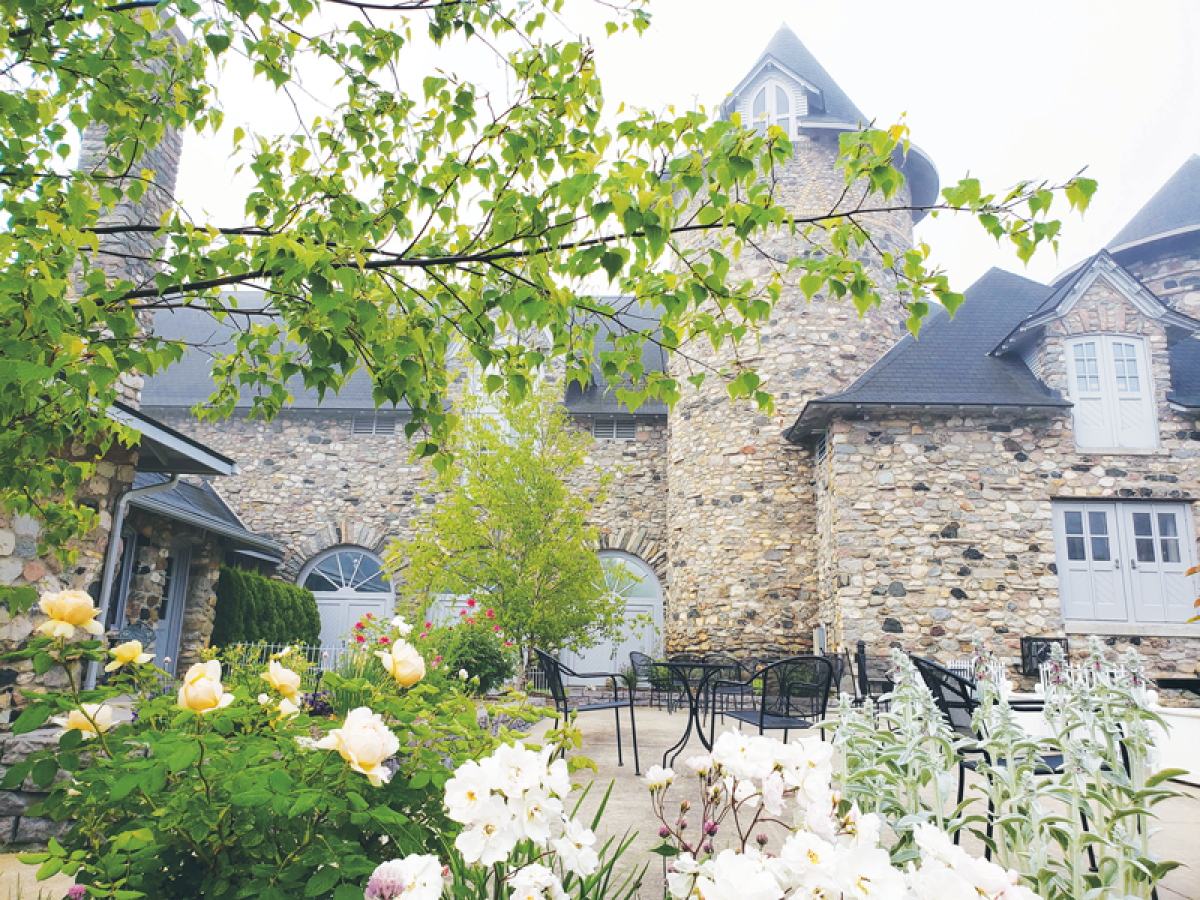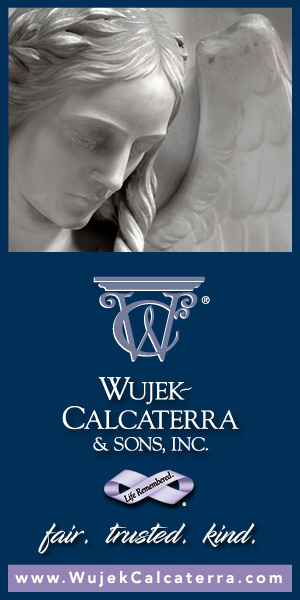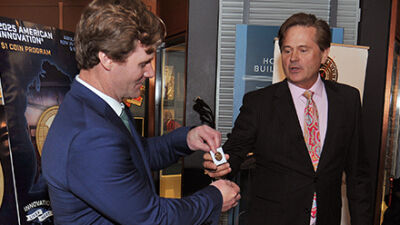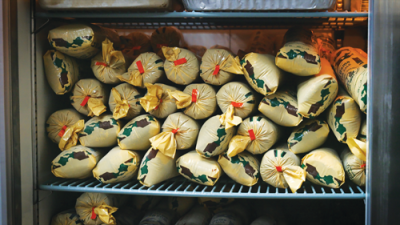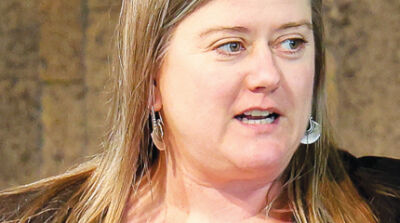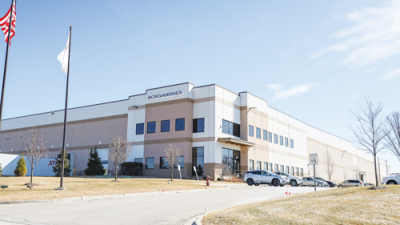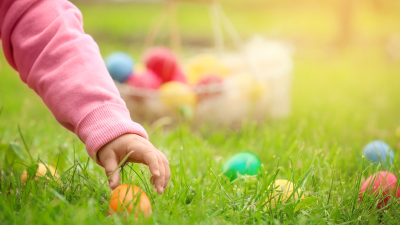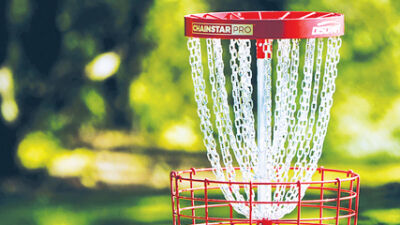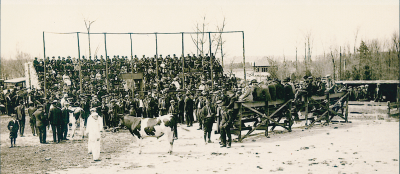
The castle was built not as a home but as a working model dairy farm and a place to showcase the latest advances in farm equipment. Pictured here is cow auction held on the grounds.
Photo provided by Castle Farms
By Greg Tasker
CHARLEVOIX — When most people think of northern Michigan, images of Renaissance-style castles don’t readily spring to mind.
Yet, such a castle, one with a storied history and ties to state and national memories, stands outside Charlevoix, tucked among the expansive farms, orchards, lakes and small towns of this inviting patch of northern Michigan.
Its existence perplexed me for years. Until a recent visit, I knew nothing about this castle, now called Castle Farms, except that it was a wedding venue. It turns out that Castle Farms is so much more and well worth a visit.
Built in 1918, the castle, after years of being abandoned, was restored by its current owner, Linda Mueller, who purchased the property with her late husband, Richard, in 2001. Since then, gardens have been replanted or added, along with other amenities, including a miniature railroad and wine bistro. More recently, a cluster of barns were revamped into Hungry Ducks Farm, a petting farm for children and families.
To visit Castle Farms today is to walk through eras of history, from the early decades of the last century to the present. Stories from its past incarnations are as plentiful as the maple and oak trees in nearby forests.
The man behind the castle was Albert Loeb, acting president of Sears, Roebuck and Company. He had an affinity for the architecture of Renaissance castles and the stone farms of Normandy, France. The castle was built not as a home but as a working model dairy farm, a place to showcase the latest advances in farm equipment, all available through the Sears catalog, the Amazon of its day.
This was a big dairy farm, part of an 1,800-acre tract that included a private home for the Loeb family. Loeb Farms boasted the most modern milking machinery and was home to 200 head of Holstein-Friesian cows. The star producer was Marion, who was milked six times a day. She consistently set records in milk production and in one banner year — 1922 — produced 35,000 pounds of milk (well above the average 25,000 pounds) and made headlines.
The cows lived a good life. They were housed in two wings — now known as the East and West Garden rooms, replicated during the restoration. They grazed in a courtyard between the wings and elsewhere on the farm. Instead of the normal whitewash, the barn walls were covered in tile lining and the floor was paved. The barns were hosed down regularly.
“The milking barns were so clean you could eat off the floor,” says Jessica Anderson, who is director of guest services at Castle Farms and made the time to walk me through the property and share many stories of its past.
At its peak, Loeb Farms was the largest employer in the Charlevoix region, with more than 90 people among its daily work force, Anderson says. The farm also boasted a semi-professional baseball team, the Sodbusters, who played on a field north of the barn complex.
“In the evening, during wedding rehearsal dinners, our staff regularly hear the crack of a baseball and bat from the ball diamond,” Anderson says, adding a haunted tour planned for the fall will share more ghost stories from Castle Farms.
Unfortunately, the farm closed in 1927, a few years after Loeb’s death and a family tragedy. Many visitors have some knowledge of the family’s connection to a notorious Chicago murder. Anderson is well prepared to answer those questions and share what she knows. One of Loeb’s sons, Richard Loeb, was convicted, in 1924, of the kidnapping and murder of a 14-year-old boy. The murder garnered national headlines. Lawyer Clarence Darrow represented the young Loeb and his crime partner in court — just before the famed Scopes “Monkey” Trial.
Decades later, the large empty stone walls caught the artistic eye of John VanHaver, a Muskegon businessman. He was also an artist and sculptor with a background in metallurgy and metal casting.
His dream? An artists’ mecca with a Renaissance theme. He purchased 100 acres of the original Loeb property, including the barns, office, blacksmith shop and manager’s house, and renamed the site Castle VanHaver. He opened the grounds to the public. Visitors could browse art but also have a cup of coffee and snacks in the Queen’s Courtyard.
Unfortunately, financial difficulties forced VanHaven to sell the property in 1969.
New owners, Arthur and Erwina Reibel, came along, initially envisioning the farm as a riding academy. Their plans, however, evolved to include an outdoor concert venue. A 50-foot wide, covered concrete steel stage was constructed and two wings (where the cows once lived) were removed to accommodate larger crowds and reserved seating.
Consider Castle Farms the Pine Knob of the north. Just about every major recording act in the late 1970s through the early 1990s rocked the stage here. That roster includes Bob Seger, the Doobie Brothers, Heart, Def Leppard, KISS, Iron Maiden, Ted Nugent, REO Speedwagon, Tina Turner and Bob Dylan, and many more.
The music is long gone but stories linger. Aerosmith reportedly had a water fight in the artesian well in the Queen’s Courtyard. Bon Jovi carved his name in a stone in a room that now serves as a changing room for wedding couples. Ozzie Osburn is remembered as a Dracula figurine in one of Mueller’s miniature collections.
The property went up for sale — again — in 1999.
Thanks to Mueller, the castle we are able to visit today has been restored — its crumbling fieldstone walls and windows repaired, along with other buildings on the property, now just 37 acres.
Castle Farms celebrated its centennial in 2018 and opened a winery, 1918 Cellars, named after the year in which the castle was founded. The winery is temporarily closed (expected to reopen by November). It’s an inviting place to linger after a tour and ponder the history of this unusual structure and its many incarnations.
It’s a treat to walk through the castle, to hear interesting stories here and there, and to muse over the vast collection Mueller has amassed. The 1918 Museum, for instance, honors not only World War I but includes a collection of products Sears sold, complete with the original advertising. There’s a barrel-shaped washing machine for $7.95. A 1918 bicycle with wooden wheels — a luxury then — priced at $28.95. Her collection includes wedding cake toppers, not common in 1918 but something Sears eventually mass produced and helped popularize.
Castle Farms
5052 M-66
Charlevoix, MI 49720
(231) 237-0884
info@castlefarms.com
Self-guided and guided tours available; guided tours are two hours and include a Tram Tour of the property (in season). Hours vary: Currently, 10 a.m. to 4 p.m. Tuesdays through Sundays. Hours are extended in the summer months.
 Publication select ▼
Publication select ▼